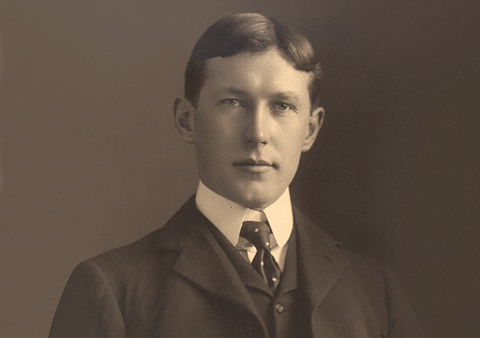A full century after John McCrae (BA 1894 UC, MB 1898, MD 1910) wrote In Flanders Fields, his simple words remain fresh and stirring for new generations who visit Soldiers’ Tower on the St. George campus. Outdoors, visitors can trace McCrae’s name inscribed on a memorial wall among a long list of his contemporaries sacrificed to conflict. Inside, they can study a portrait of the poet and see McCrae’s poppies, crosses and larks pieced into a soaring stained glass window in the Memorial Room.
To commemorate the on-the-battlefield composition of the poem at Ypres 100 years ago, Soldiers’ Tower hosted a carillon recital and commemoration in May of this year, and the event “was filled to capacity,” says Kathy Parks, the Tower administrator. November’s annual Remembrance Day ceremony always draws more than 1,000 people, she adds, demonstrating that the day “continues to hold meaning for young and old.” Each year, the service features a reading of McCrae’s poem, which inspired the poignant and enduring symbol of the poppy. “Millions of people around the globe know of the poppy,” Parks says, “even if they don’t know about the poem.”
The top student in his medical class at U of T, as well as a researcher, poet, soldier and surgeon, McCrae was inducted into The Canadian Medical Hall of Fame this year.
Listen to a dramatic reading of “In Flanders Fields” by U of T drama students:





